最新人教版八年级英语下册各单元语法点汇总
初二英语下册知识点归纳人教版
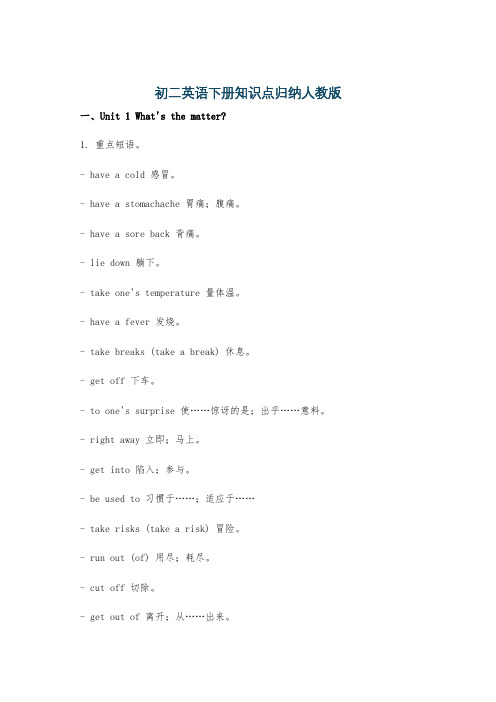
初二英语下册知识点归纳人教版一、Unit 1 What's the matter?1. 重点短语。
- have a cold 感冒。
- have a stomachache 胃痛;腹痛。
- have a sore back 背痛。
- lie down 躺下。
- take one's temperature 量体温。
- have a fever 发烧。
- take breaks (take a break) 休息。
- get off 下车。
- to one's surprise 使……惊讶的是;出乎……意料。
- right away 立即;马上。
- get into 陷入;参与。
- be used to 习惯于……;适应于……- take risks (take a risk) 冒险。
- run out (of) 用尽;耗尽。
- cut off 切除。
- get out of 离开;从……出来。
- be in control of 掌管;管理。
2. 重点句型。
- What's the matter? = What's wrong? = What's the trouble? 怎么了?- Should I put some medicine on it? 我应该在它(伤口)上敷些药吗?- You should lie down and rest. 你应该躺下休息。
- He hurt himself in P.E. class. 他在体育课上伤到了自己。
- Aron Ralston is an American man who is interested in mountain climbing. 阿伦·罗尔斯顿是一个对登山感兴趣的美国人。
3. 语法。
- 情态动词should的用法:should表示“应该”,用来提出建议或劝告,后接动词原形。
例如:You should see a dentist. 否定形式为shouldn't,例如:You shouldn't go to school late.二、Unit 2 I'll help to clean up the city parks.1. 重点短语。
新人教版|八年级下册英语所有知识点大汇总
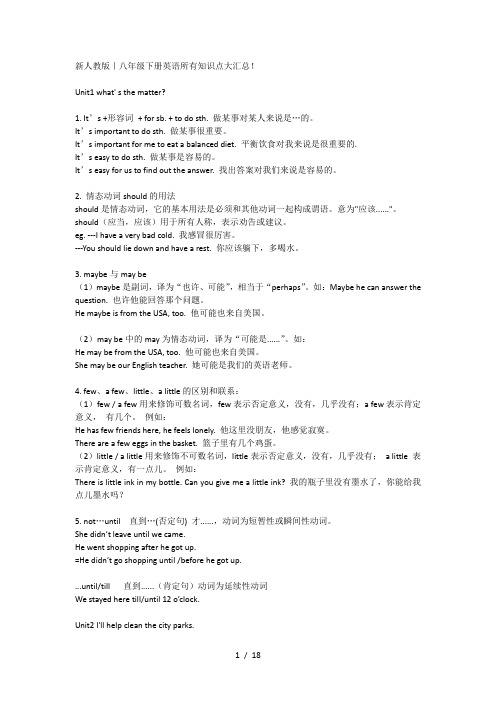
新人教版|八年级下册英语所有知识点大汇总!Unit1 what' s the matter?1. It’s +形容词+ for sb. + to do sth. 做某事对某人来说是…的。
It’s important to do sth. 做某事很重要。
It’s important for me to eat a balanced diet. 平衡饮食对我来说是很重要的.It’s easy to do sth. 做某事是容易的。
It’s easy for us to find out the answer. 找出答案对我们来说是容易的。
2. 情态动词should的用法should是情态动词,它的基本用法是必须和其他动词一起构成谓语。
意为"应该......"。
should(应当,应该)用于所有人称,表示劝告或建议。
eg. ---I have a very bad cold. 我感冒很厉害。
---You should lie down and have a rest. 你应该躺下,多喝水。
3. maybe与may be(1)maybe是副词,译为“也许、可能”,相当于“perhaps”。
如:Maybe he can answer the question. 也许他能回答那个问题。
He maybe is from the USA, too. 他可能也来自美国。
(2)may be中的may为情态动词,译为“可能是......”。
如:He may be from the USA, too. 他可能也来自美国。
She may be our English teacher. 她可能是我们的英语老师。
4. few、a few、little、a little的区别和联系:(1)few / a few用来修饰可数名词,few表示否定意义,没有,几乎没有;a few表示肯定意义,有几个。
例如:He has few friends here, he feels lonely. 他这里没朋友,他感觉寂寞。
人教版初中英语八年级下册全册各单元知识点、语法归纳整理
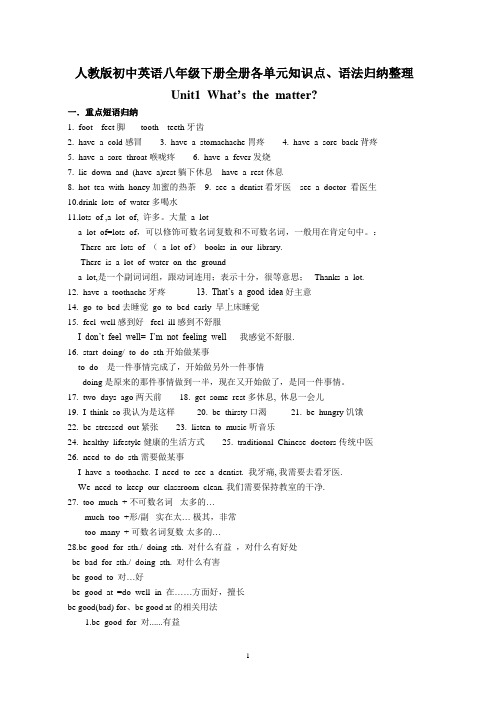
人教版初中英语八年级下册全册各单元知识点、语法归纳整理Unit1 W hat’s the matter?一.重点短语归纳1. foot---feet 脚tooth---teeth 牙齿2. have a cold 感冒3. have a stomachache 胃疼4. have a sore back背疼5. have a sore throat喉咙疼6. have a fever发烧7. lie down and (have a)rest 躺下休息have a rest 休息8. hot tea with honey 加蜜的热茶9. see a dentist 看牙医see a doctor 看医生10.drink lots of water多喝水11.lots of ,a lot of, 许多。
大量a lota lot of=lots of,可以修饰可数名词复数和不可数名词,一般用在肯定句中。
:There are lots of (a lot of)books in our library.There is a lot of water on the grounda lot,是一个副词词组,跟动词连用;表示十分,很等意思;Thanks a lot.12. have a toothache牙疼13. That’s a good idea好主意14. go to bed 去睡觉go to bed early 早上床睡觉15. feel well感到好 feel ill 感到不舒服I don’t feel well= I’m not feeling well我感觉不舒服.16. start doing/ to do sth开始做某事to do 是一件事情完成了,开始做另外一件事情doing是原来的那件事情做到一半,现在又开始做了,是同一件事情。
17. two days ago两天前18. get some rest 多休息, 休息一会儿19. I think so我认为是这样20. be thirsty口渴21. be hungry 饥饿22. be stressed out紧张23. listen to music听音乐24. healthy lifestyle健康的生活方式25. traditional Chinese doctors传统中医26. need to do sth 需要做某事I have a toothache. I need to see a dentist. 我牙痛, 我需要去看牙医.We need to keep our classroom clean. 我们需要保持教室的干净.27. too much + 不可数名词太多的…much too +形/副实在太…极其,非常too many + 可数名词复数太多的…28.be good for sth./ doing sth. 对什么有益,对什么有好处be bad for sth./ doing sth. 对什么有害be good to 对…好be good at =do well in 在……方面好,擅长be good(bad) for、be good at的相关用法1.be good for 对......有益Doing morning exercises is good for your health.做早操对你们的建康有益。
新人教版八年级英语下册第1--第10单元知识点总结
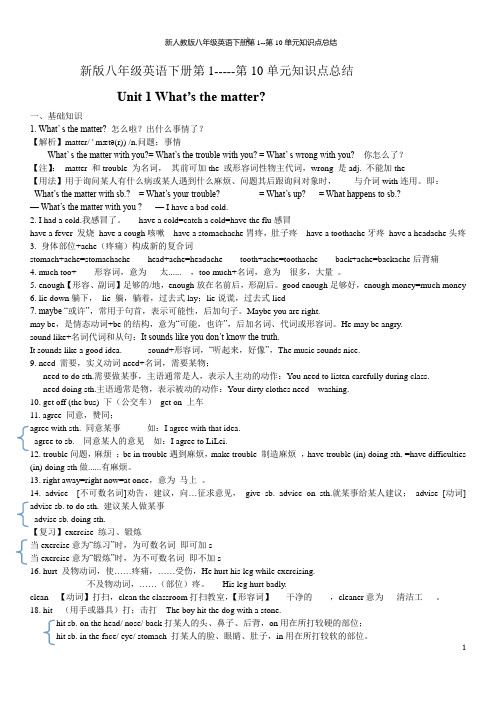
新版八年级英语下册第1-----第10单元知识点总结Unit 1 What’s the matter?一、基础知识1. What’ s the matter? 怎么啦?出什么事情了?【解析】matter/ ' mætə(r)) /n.问题;事情What’ s the matter with you?= What’s the trouble with you? = What’ s wrong with you? 你怎么了?【注】:matter 和trouble 为名词,其前可加the 或形容词性物主代词,wrong 是adj. 不能加the【用法】用于询问某人有什么病或某人遇到什么麻烦、问题其后跟询问对象时,与介词with连用。
即:What’s the matter with sb.? = What’s your trouble? = What’s up? = What happens to sb.?—What’s the matter with you ?— I have a bad cold.2. I had a cold.我感冒了。
have a cold=catch a cold=have the flu感冒have a fever 发烧have a cough咳嗽have a stomachache胃疼,肚子疼have a toothache牙疼have a headache头疼3. 身体部位+ache(疼痛)构成新的复合词stomach+ache=stomachache head+ache=headache tooth+ache=toothache back+ache=backache后背痛4. much too+ 形容词,意为太...... ,too much+名词,意为很多,大量。
5. enough【形容、副词】足够的/地,enough放在名前后,形副后。
good enough足够好,enough money=much money6. lie down躺下,lie 躺,躺着,过去式lay;lie说谎,过去式lied7. maybe “或许”,常用于句首,表示可能性,后加句子。
人教版英语八年级下册Unit 1-5 单元语法知识梳理
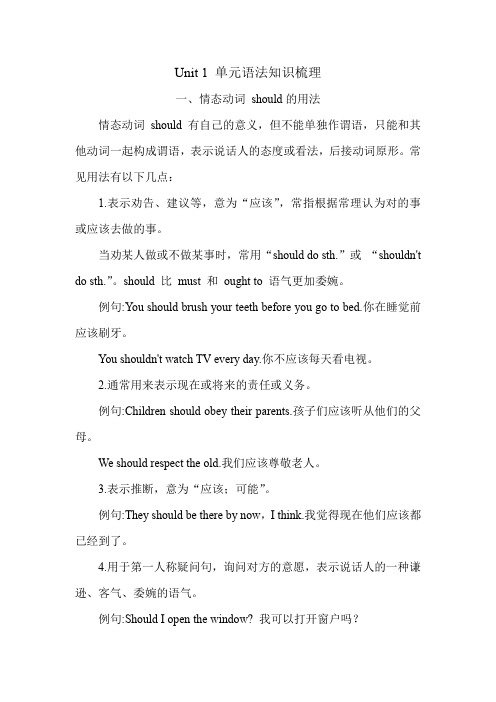
Unit 1 单元语法知识梳理一、情态动词should的用法情态动词should有自己的意义,但不能单独作谓语,只能和其他动词一起构成谓语,表示说话人的态度或看法,后接动词原形。
常见用法有以下几点:1.表示劝告、建议等,意为“应该”,常指根据常理认为对的事或应该去做的事。
当劝某人做或不做某事时,常用“should do sth.”或“shouldn't do sth.”。
should 比must 和ought to 语气更加委婉。
例句:You should brush your teeth before you go to bed.你在睡觉前应该刷牙。
You shouldn't watch TV every day.你不应该每天看电视。
2.通常用来表示现在或将来的责任或义务。
例句:Children should obey their parents.孩子们应该听从他们的父母。
We should respect the old.我们应该尊敬老人。
3.表示推断,意为“应该;可能”。
例句:They should be there by now,I think.我觉得现在他们应该都已经到了。
4.用于第一人称疑问句,询问对方的意愿,表示说话人的一种谦逊、客气、委婉的语气。
例句:Should I open the window? 我可以打开窗户吗?What should we do now? 我们现在该干什么呢?5.表示某种感情色彩,意为“竟会”,常用于以how, why开头引导的特殊疑问句中。
例句:Why should you be so early today? 你今天为什么会如此早?二、反身代词1.反身代词的构成反身代词是一种表示反射或强调的代词。
它由第一人称、第二人称的形容词性物主代词和第三人称代词的宾格加词尾-self或-selves构成。
其构成如下表:反身代词与它所指代的名词或代词形成互指关系,两者在人称和数上应保持一致。
人教版八年级英语下册重要语法知识点汇总

人教版八年级英语下册重要语法知识点汇总人教版八年级英语下册重要语法知识点汇总1. 否定句型1) 一般否定句I dnt knw this. N news is gd news.There is n persn (ske)/nt a persn/nt any persn (ske) in the huse.2)特指否定He went t his ffie, nt t see hi.I a srry fr nt ing n tie.I dnt think/believe/suppse/feel/iagine yu are right.3)部分否定All the answers are nt right//All is nt gld that glittersI dnt knw all f the.//I ant see everybdy/everything.Bth f the are nt right.4)全体否定Nne f y friends ske.//I an see nthing/nbdy.Neither f the is right.//Nthing an be s siple asthis.5) 延续否定yu didnt see hi, neither/nr did I.yu dnt knw, I dnt knw either.He desnt knw English, let alne/t say nthing f/nt t speak f (更不用说) Frenh.6) 半否定句e seld/hardly/sarely/barely hear suh fine singing.I knw little English. I saw few peple.7) 双重否定yu ant ake sething ut f nthing.//hats dne annt be undne.There is n sweet withut sweat.//N gain withut pains.I ant help /keep/ laughing whenever I hear it.N an is s ld but (that) he an learn.8)排除否定Everyne is ready exept yu.//He did nthing but play.But fr yur help, I uldnt d it.9)加强否定I wnt d it at all.//I ant see it any re.//He is n lnger a by.2. 判断句型1) 一般判断句It is iprtant fr us t learn English.It is kind f yu t help e sinere eans hnest.The by is alled/naed T.e regarded/nsider it as an hnr.2)强调判断It is English that we shuld learn.//It is he wh helped e a lt.3)弱式判断yur sentene desnt sund/lk/appear/feel right.yu lk/see as if/as thught yu had been there befre.aybe/Perhaps/ she is ill.He is prbably ill.//He is likely ill. //It is pssible that he is late4) 注释判断He an reeber s any English wrds, that is (t say) he is a living ditinary.(活字典)5) 正反判断That sunds all right, but in fat it is nt.6) 比较判断It is re a piture than a pe.7) 互斥判断He r yu are wrng. Either he is right r I a.3. 祝愿祁使句式1) 一般句式Study hard and keep fit. Be brave! Dnt be shy! Get ut f here.2)强语式D tell e. Never tell a lie.3) 委婉祈使句Please tell e the true. uld/ill/nt d e a favr?uld/D yu ind y sking? hat/Hw/ abut ging n ft?4)建议祈使句Let us g. Let us knw the tie. Dnt let the fire ut.Lets nt waste the tie. yud better start early.Shall we listen t se usi? hy dnt yu get sething t drink?Suppse/suppsing yu pik e up at abut six?I suggest we (shuld) take the train.5)祝愿句Suess t yu! //ish yu a gd urney.ay yu have a happy arriage. //Heres t yur suess!Allw e t prpse a tast t ur friendship!4. 感叹句型Hw well he speaks! //Hw kind she is! //hat a nie weather it is!Here he es! //Suh is life! //nderful! // Help!5. 疑问句型1) 一般疑问句Is he a dtr?//D yu the way t the statin?2)反意疑问句He is a teaher, isnt he?//It is quite heap, dnt yu think?3) 特殊疑问句hat is the distane/width/size/ppulatin/teperature/fare?h is he? hat is he?(干什么的)//hat is he like? // Hw is he?Hw d yu like hi? //hat d yu think f hi?hat ever d yu ean by saying this?4)选择疑问句He is a dtr r a nurse?5)间接疑问句D yu knw hw ld he is? //Tell e if (whether) yu like it.hat d yu think/say/suppse I shuld d?6. 数词句型1) 表数目It is exatly ten lk.//It is five iles away fr here.He is re than/ver/ at least nt less than 20.He is under/at st/n re than 20.2)表年月日He was brn n April 22 1994/in 1994 n the rning f t.1.3)表年龄He is 20 years ld/years f age.//He is at the agef 10.4)表倍数It is fur ties that f last years.This is fur ties as big (again) as that ne.This is fur ties bigger than that ne.The ine is duble what it was.The utput f al was 200% greater than in 1998.5)表计量It is 10 eters lng/wide/high.//It sts e 100 yuan.I spent 10 hurs t finish it.//It tk e 10 days t finish it.It is wrth 100 yuan.7. 关联指代句型1)两项关连I have tw bks, ne is hinese; the ther English.I have five bks, ne is hinese; the thers English.T say is ne thing, but/and/ t d is anther.ne the ne hand, I a yur teaher, and n the ther hand, I a als yu friend.Se like t play ftball, thers are fnd f basketball.2)先后顺序First/firstly, I wish gd health, send/sendly suess in yur study, third/thirdly gd luk in everything.First stp, then lk, finally rss.At first/in the beginning/ he wrd hard. Later/Afterwards he is nt s diligent.3)修饰限制This is the sae bk as I lst yesterday.This is the sae bk that I lst yesterday.(同一本书)Dnt trust suh a an as ver praise yu.He/ne/Thse/They wh shuld e failed t appear.A an/A persn/The ne/Anyne/Peple wh saw her liked her very uh.The day/tie/ent will e when hina is strngest in the wrld.4) 两项连接He an speak nt nly English but als Frenh.The bk is bth interesting and instrutive.It is neither ld nr ht.Please either e in r g ut.The ld wrker has experiene and knwledge as well.5)加和关系Besides literature, we have graar and writing.Apart fr xygen, there are se ther gases in the air.In additin t "if", there is any ther nuntins that an intrdue nditinal lauses.I ust g nw, inidentally, if yu want that bk.yu see t like tea, s d I.8. 比较句型1)等比句He is as tall as I. // He is the sae height as I.She is n less diligent than he. The lab is n better than a ttage.2) 差比句I speak English wrse than he des.//He is nt s/astall as I a.ur knwledge is uh inferir t their.3) 极比句He is the tallest f all in the lass.Nne/N ne/ is s blind as thse that wnt see.Nthing is s easy as this.4)比例句The re a an knws, the re he feels his ignrane(无知).5) 择比句He is taller than any ther by in the lassIt is better late than never.//They wuld die than live as slavesHe prefers ding t talking//He prefers t d rather than t talk.He prefers atheatis t English.//Id rather stay here.6)对比句yu think e idle, but n the ntrary, I a busy.They are wrking hard while yu are wasting yur tie.9. 比喻句型e ust wrk like hi.//He behaves as his father des.He speaks English as if/thugh he was a freigner.10. 条件假设句1) 一般事实If we sueed, what will the peple say?Suppse it rains, what shall we d?Persevere(坚持) and yull sueed.2)虚拟条件句If I were yu, I wuld g.//If yu had seen it, yu wuld have been ved.3)反条件句Unless yu try, yull never sueed.//Dnt ve, r/else/therwise Ill sht.4)唯一条件句If nly I have anther hane, I shall d better.nly in this way an we learn English well.S/As lng as we dnt lse heart, well sueed.5)推论条件句Sine that is s, there is n re t say.Nw that yu are grwn up, yu ust stp this behavir.11. 时间句型1)一般时hen I see hi, Ill tell hi.2) 表同时yull grw wiser as yu grw lder.rk while yu wrk, play while yu play.He wrked, at the sae/in the eantie he listened t the usi.3)限制时Every/eah tie when I went t his huse, he was ut.By the tie that we gt there, he was ut.4)交替时Seties he sings, seties he danes.At ne tie the baby ries, at anther it talks.5)先时I stpped he befre he began t talk with e.6)后时Ill tell yu after I finish it.7)紧接时As sn as I see hi, Ill tell hi.ne yu begin, yu ust ntinue.The (very) ent/instant (that) I saw hi, I regnized hi.n hearing the news, she bust int tears.Hardly had I seen the light, when I heard a lud thundering.8)延续时I havent seen hi sine I ae here.A friend is never knw till/until a an have need.12. 地点句型1) 一般地点here have yu been?here there is a will, there is a way.2)方位Hebei lies in the east f hina.apan is lies t the east f hina.The huse faes (t) the suth.He is sitting at the frnt f the lassrHe is standing in frnt f/befre e.He is sitting at the bak f/behind e.He is sitting in the bak f/at the rear f the lassr. He is sitting next t/besides e.He is sitting lse t/near e.At the tp f/n tp f the shelf, there are se bks. He is sitting n the left/right.The untain yu see t the right is the Purple untain.13. 原因句型He didnt g t shl beause he was ill.Sine we are all here, lets begin ur eeting.It ight rain yesterday, fr the grund was wet.Nw (that) we have finished the wrk, we an g he.I a glad t eet yu.I a srry that I hear that.Thank yu fr yur help.That is why he failed t e.He didnt e beause f/n aunt f the weather.He went ut f urisity.I sueeded thanks t his help.This failure is due t the fat they lak experiene.wing t ur int effrts, the task was fulfilled.hat are studying English fr?Fr what reasn did yu hse this?hats the pint f asking his t d that?Hw e yu never tld e abut it?hat with the wind and what with the rain, ur walk was spiled.14. 目的句型He stpped aside s that she uld g in.He sits in the frnt in rder that he an see wrds learly.He gets up early s as t/in rder t have tie t d exerises.He repeated it fr fear that there shuld be any istake.15. 结果句型It was very ld, s that the river frze.They st a lt f ney, s/therefre we use the arefully.He is suh a gd an that every ne likes hi.He ran s fast that n ne uld ath hi.He hurried t the huse nly t find that it was epty.I was aught in the rain. As a result, I had a bad ld.16. 程度句型Hw ften d yu write t yur parents?Hw lng d yu stay at he?It is s beautiful that we all lve it.It is t big fr yu.He is t exited t speak.He is nt ld enugh t knw this.The letter ust be sent as sn as pssibleyu ust wrk as hard as yu an.As far as I knw, I an speak nly English.17. 让步句型Thugh/Althugh he is rih, (yet/still) he desnt shw ff.yang as he is, he knw a lt f things.Even if/thugh he sueeded, he was nt prud.N atter what yu say, Ill still try t d it.keep al, whatever happens.In spite f this, we ust g ahead with ur plans.Regardless f all the diffiulties, well fight it ut t the end.18. 转折句型I searhed everywhere but uld nt find hi.yu ay g, nly return quikly.He is seriusly ill, still there is hpe f his revery.It lked like rain, hwever it was lear in the afternn.He is still yung, yet he is high up in the psitin.He didnt tell e the truth, I knw it, thugh.19. 省略句I think/say/suppse/expet/believe/hpe s.hy nt e earlier next tie?。
新版人教版八年级下英语语法重点归纳(全)

新版人教版八年级下英语语法重点归纳(全)一、名词名词是指用来表示人、事物、地方、动物等的名称的词语。
名词分为可数名词和不可数名词。
可数名词有单数和复数两种形式,而不可数名词只有单数形式。
- 可数名词:表示单数时,名词前面通常有冠词a/an或者其它数量词进行修饰;表示复数时,名词通常要在词尾加“s”。
- 不可数名词:不可数名词表示的是无法分为个体的物体、概念、抽象事物等,通常不能用于复数形式。
二、动词动词表示人或物的动作、行为、状态或存在的词语。
动词分为及物动词和不及物动词。
- 及物动词:及物动词后面可以直接接宾语,表示动作的承受者或影响对象。
- 不及物动词:不及物动词不能直接接宾语,它可以后面接副词或介词短语,表示动作发生的方式、状态等。
三、形容词形容词是用来描述名词性词语的词语。
它可以表示人或物的性质、状态、特征、颜色等。
- 形容词可以修饰名词,放在名词的前面。
- 形容词还可以通过加后缀“-er”和“-est”来比较级和最高级。
四、副词副词是用来修饰动词、形容词和其他副词的词语。
副词可以表示时间、地点、方式、程度、频率等。
- 副词在句中通常位于动词、形容词或者其他副词的前面。
- 副词的比较级和最高级可以通过在前面加上more和most来表示。
五、代词代词是用来代替名词或名词性的词语的词语。
代词可以分为人称代词、指示代词、疑问代词、不定代词等。
- 人称代词表示人的身份或人称,包括主格和宾格两种形式。
- 指示代词用来指示特定的人或物,可以表示近处的、远处的或已提到的事物。
- 疑问代词用于提问,通常用来询问人或事物的身份、性质、数量等信息。
- 不定代词用来指代不特定或泛指的人或物,表示数量或程度。
六、冠词冠词是位于名词前面用来修饰名词的词语。
冠词分为定冠词和不定冠词。
- 定冠词指特指某一具体的人或事物,有两种形式:定冠词“The”用于表示特定的人或物,而不定冠词“A/An”用于泛指任意的人或物。
七、介词介词是用来表示人或物之间关系的词语。
最全面人教版八年级下册英语各单元知识点总复习归纳总结

最全面人教版八年级下册英语各单元知识点总复习归纳总结Unit 1 How often do you exercise?词汇1. frequently 经常地2. hardly 几乎不3. ever 曾经4. once in a while 时不时5. rarely 很少语法一般现在时1. 频率副词放在动词前:I always read newspapers.2. 否定句用don't或doesn't+动词原形:I don't watch TV every day.3. 疑问句用do或does+主语+动词原形:Do you play soccer every week?Unit 2 I used to be afraid of the dark.词汇1. used to 过去常常2. get over 克服3. nervous 紧张的4. confident 有信心的5. stage 舞台语法1. Be used to+动名词表示惯或适应,I am used to studying English at night.2. Used to+动词原形表示过去常常,I used to read books every day.3. Get over+名词/代词/动名词,表示克服,She got over the flu last week.Unit 3 Could you please tell me where the restaurants are?词汇1. instruction 说明2. turn right/left 向右/左转3. excuse me 对不起4. straight 直走5. opposite 对面语法1. Could you please/could/may I+动词原形,请求礼貌地做事,Could you please help me with my English?2. Would like+名词 / 动名词,表示想要做某事,I would like to go shopping with you.3. May I ask+句子,礼貌地询问某事,May I ask where the restroom is?Unit 4 Why don't you talk to your parents?词汇1. conversation 对话2. listener 听众3. honest 诚实的4. conversation starter 聊天开场白5. effective 有效的语法1. How about/What about+动名词/名词,表示建议和提议,What about watching a movie?2. Why not+动词原形,表示建议和提议,Why not go swimming?3. Let's+动词原形,表示建议和提议,Let's have a party on the weekend.Unit 5 It must belong to Carla.词汇1. sweater 毛衣2. by accident 偶然地3. honest 诚实的4. lose 丢失5. owner 拥有者语法1. Can/Can't+动词原形,表示能力或可能性,I can dance.2. Must/Mustn't+动词原形,表示肯定或否定的推断,She must be the new teacher.3. Have/Has to+动词原形,表示必须做的事情,I have to finish my homework first.词汇1. graduate 毕业生2. physics 物理学3. ambitious 有抱负的4. career 职业5. education 教育语法一般将来时1. be going to+动词原形,表示打算做某事,I am going to see a film tonight.3. be + going to+现在进行时,表示不久会发生的事情,They are going to sing a song later.Unit 7 How do you make a banana milk shake?词汇1. recipe 食谱2. whip 打(奶油)3. peel 去皮4. slice 切片5. pour 倒语法1. What/How/Which+系动词+主语+谓语,表示特定的主语或具体的内容。
- 1、下载文档前请自行甄别文档内容的完整性,平台不提供额外的编辑、内容补充、找答案等附加服务。
- 2、"仅部分预览"的文档,不可在线预览部分如存在完整性等问题,可反馈申请退款(可完整预览的文档不适用该条件!)。
- 3、如文档侵犯您的权益,请联系客服反馈,我们会尽快为您处理(人工客服工作时间:9:00-18:30)。
最新人教版八年级英语下册各单元语法点汇总Unit 1 What’s the matter一、询问某人的健康问运及遭到麻烦的表达方法(1)询问某人患了何种疾病或遇到了何种麻烦时,常用以下几种结构来表达: What’s the matter (with sb.)怎么了? What’s wrong (with sb.)怎么了?What’s the trouble (with sb.)出什么事了? What happened (to sb.)发生了什么事? Are you OK你没事吧?Is there anything wrong with sb.?某人有什么事吗?(2)要表达身体疼痛或不舒服,可用以下结构:①某人+have/has+病症.The twins have colds.双胞胎感冒了。
某人+have/has+a+headache/toothache/stomachache/backache /earache. She had a stomachache last night.她昨晚肚子痛。
③某人+have/has+a+sore+发病部位. He has a sore throat.他喉咙痛。
④某人+hurt(s)+身体部位或反身代词. He hurt his leg.他的腿受伤了。
⑤某部位+hurt(s).My head hurts badly.我头痛得厉害。
⑥某人+have/has+a pain+in one’s+身体部位, I havea pain in my chest.我胸口痛。
⑦(There is)something wrong with one’s+身体部位. There is something wrong with my right eye..我的右眼有毛病。
⑧其他表达方式She has a heart trouble.她有心脏病。
He got hit on the head他头部受到了撞击。
She cut her finger.她割破手指了。
二情态动词should的用法1.Should为情态动词,意为“应该;应当”,否定式为shouldn’t,其后接动词原形,无人称和数的变化。
常用来表示征询意见、建议、劝告、要求或义务等。
You should drink hot water with honey.你应该喝加有蜂蜜的开水。
He should put his head back他应该把头后仰。
We should try our best to help him.我们应当尽力去帮助他。
You shouldn‘t watch TV.你不应该看电视。
2.Should用于主语为第一人称的疑问句,表示征询意见。
Should I put some medicine on it我应当给它敷上药吗? Should we tell her about it我们应该告诉她这件事吗?【拓展】在英语中,表示建议的说法有很多,而且都是中考考查的重点。
主要结构有:①Would you like (to do) sth.?你想要/愿意某事吗?Would you like to play basketball with me你想要和我一起打篮球吗?②Shall I/we do sth 我/我们做好吗?Shall we go to the zoo tomorrow明天我们去动物园,好吗?③Why not do sth 为什么不呢?Why not join us为什么不加入到我们当中来呢?④How/What about doing sth 做某事怎么样? How about going swimming去游泳怎么样?⑤Let’s do sth 让我们做吧。
Let’s go home.咱们回家吧。
⑥You’d better (not) do sth你最好要做某事。
You’d better not go there alone.你最好不要一个人去那儿。
Unit 2 I'll help clean up the city parks动词不定式A. 作主语——为避免句子的头重脚轻,常用it作为形式主语,而真正的主语动词不定式后置。
常用句型:It +be+adj./n.+(for/of sb.) to do sth./It takes sb. some time to do sth.B. 作宾语——动词want, decide, hope, ask, agree, choose, learn, plan, need, teach, prepare…常接动词不定式作宾语。
C. 作定语——常用于“have/has+sth.+to do”或“enough+名+to do”“It’s time to do sth.”等结构中。
D. 作宾语补足语——tell, ask, want, invite, teach, like, call等可接带to的动词不定式作宾语补足语,构成tell/ask/want /call/invite sb. to do sth.结构。
【注意】动词不定式作使役动词和感官动词的宾语补足语时应省去to:“一感(feel),二听(listen to, hear),三让(let, make, have,,四看(look at, see, watch, notice),半帮助(help)”。
E. 动词不定式作状语主要用来修饰动词,表示目的,结果或原因。
为了强调目的,有时可以把动词不定式放在句首,或在不定式前加in order (to) 或so as (to) “为了,目的是”。
常用结构有too + adj./adv. + to do sth.等。
F. 固定句式中动词不定式的用法常见的形式有:had better (not) do sth./Would you like to do sth./Why not do sth./Would you please (not) do sth.等。
Unit 3 Could you please clean your roomCould you please...句型请求别人时通常用此句型,也可以说:Can you...please 情态动词could或can在这里均表示请求,在意思上无区别,但是用could在于其上显得更委婉、客气、诚恳。
在日常生活中常使用could you/I...若在句末加上please,则显得更礼貌。
Could you help me find my book,please你能帮我找到我的书吗?对could you/I...的问句作出肯定回答,常用“sure/certainly/of course”等;如果作否定回答,常用“sorry或oh,please don’t”。
一般不用no开头,用no显得语气生硬、不礼貌。
表示请求的句式:Would you like to do... Would you mind doing... Let’s do.... Shall I/we do... Please do...(祈使句前加please)提示:could you please...与could I Please...两种问句,前者是请求别人帮忙的句式,后者是有礼貌地向别人请求允许的交际用语。
试比较:Could you please help me请你帮我一下好吗?Could I please invite my friends to my birthday party,Mom 妈妈,我能邀请我的朋友参加我的生日聚会吗?Unit 4 Why don't you talk to your parents1.提建议向别人发出邀请,请求,建议,或征求某人的意见的其他表达方式:How /what about doing sth.“…怎么样?”You’d better (not) do something.“你最好做某事”Would you like sth …:“你想要某物Lets do sth… What should I do … ( should表示请求、征询对方意见)2.学会谈论问题和学会用why don't you…提建议向别人发出邀请,请求,建议,或征求某人的意见的表达方式:Why dont you do something =Why not do something 你为什么不做某事呢?来表示请求、征询对方意见3.until, so that ,although引导的状语从句:1)until:在带有till或until引导的时间状语从句里,如果主句用肯定式,其含义是“一直到……时”,谓语动词只能用延续性动词。
如果主句用否定式,其含义是“直到……才……”, “在……以前不……”, 谓语动词可用瞬间动词。
Dont get off until the bus stops.2)so that引导目的状语从句例如:He studies hard so that he could work better in the future 3)although 的用法意思相当于though,引导让步状语从句。
引导的从句不能与并列连词but,and, so等连用,但可以和yet, still 等词连用。
例如:Although he was tired, he went on working.尽管他很累,但是他继续工作。
Unit 5 What were you doing when the rainstorm came?过去进行时1. 基本概念:过去进行时表示在过去某一时刻或一段时间内正在进行的动作。
这一特定的过去时间除有上下文暗示以外, 一般用时间状语来表示。
2. 结构 was / were ( not ) + 动词-ing 3. 句式肯定式:I/He/She/It was working. We/You/They/ were working. 否定式:I/He/She/It was not working.We/You/They/ were not working. 疑问式和简略回答:Was I working Yes, you were. No, you were not. Were you working Yes, I was. No, I was not. Was he/she/it working Yes, he/she/it was. No, he/she/it was not. Were we/you/they working Yes, you/we/they were. No, you/we/they were not. 注: 1) was not常缩略为wasn’t; were not常缩略为weren’t。
